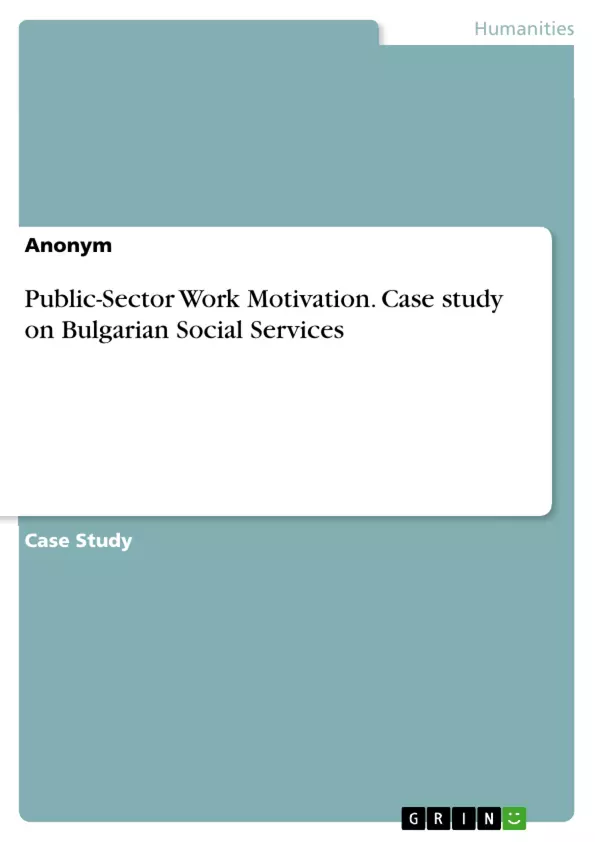This study would use the social service agency in Bulgaria, which is part of the Ministry of labor and Social policy, as a case, to research the questions: what motivates employees in the public sector to work hard and to stay in the public sector? What values and incentives play a role for their motivation? The official report from 2010 of the Public Service Administration in Bulgaria have listed public service motivation as the key challenge, which human resource management in the public administration is facing. The report from 2015 addresses the fact that the strategies to improve motivation have not produced the expected results.
The difficulty to attract young, educated people and also to maintain the good quality employees in the system are still present. This study is organized as follows. The next section presents the scientific literature found on the four factors that influence employees’ motivation. After that the methodology chosen to study this problem statement and the data gathering is explained. The result section presents the findings of the interviews and it is structured again following the four motivational concepts and it is followed by a brief discussion of the findings. Finally, the last section concludes this case study.
Inhaltsverzeichnis (Table of Contents)
- Introduction
- Theoretical framework
- Public service motivation
- Extrinsic motivation
- Intrinsic Motivation
- Organizational Structure
- Method
- Findings
- PSM
- Intrinsic factor
- Extrinsic factors
- Organizational structure
- Discussion
- Conclusion
- References
- Appendix
Zielsetzung und Themenschwerpunkte (Objectives and Key Themes)
This study aims to explore the factors that influence the motivation of employees in the Bulgarian social services sector. The research focuses on public service motivation (PSM), extrinsic and intrinsic motivational factors, and the role of the organizational structure. The study aims to understand what drives employees to work hard and stay in the public sector, and what values and incentives play a role in their motivation.
- Public Service Motivation (PSM) and its impact on employee motivation in the Bulgarian social services sector.
- The influence of extrinsic and intrinsic factors on employee motivation in the public sector.
- The role of organizational structure in shaping employee motivation.
- Exploring the relationship between employee values and incentives and their motivation in the Bulgarian social services sector.
- Comparing motivational factors in the Bulgarian public sector to other countries.
Zusammenfassung der Kapitel (Chapter Summaries)
- Introduction: This chapter introduces the research problem by highlighting the challenges faced by human resource management in the Bulgarian public administration, particularly in terms of employee motivation. It cites reports from 2010 and 2015 that highlight the difficulty in attracting and retaining qualified personnel. The study's objective is to investigate the motivations of social service employees in Bulgaria, focusing on PSM, extrinsic factors, intrinsic factors, and organizational structure.
- Theoretical Framework: This chapter presents the theoretical foundations of the study, drawing on existing literature on public sector motivation. It discusses the work of Downs (1968), Lawler (1971), Herzberg et al. (1957), and Perry and Porter (1982) to establish a framework for understanding employee motivation in public organizations. It highlights the need for further research in Eastern Europe, particularly Bulgaria, due to the scarcity of existing research on this topic.
- Public Service Motivation: This chapter focuses on the concept of PSM, defining it as an individual's predisposition to respond to motives grounded in public institutions. It explores the work of Perry and Wise (1990), who identify three key reasons for PSM: policy formulation, service to the public interest, and identification with public programs. The chapter also examines the work of Kjeldsen and Jacobsen (2013) who argue that PSM is more associated with the nature of public services than the public sector itself. This chapter further discusses the person-organization and person-job fit theories and their relevance to understanding PSM.
Schlüsselwörter (Keywords)
Public service motivation, extrinsic motivation, intrinsic motivation, organizational structure, Bulgarian social services, employee motivation, public sector, values, incentives, attraction selection process, person-organization fit, person-job fit, qualitative research, case study, semi-structured interviews.
Frequently Asked Questions
What is the focus of this study on Bulgarian Social Services?
The study researches what motivates employees in the Bulgarian public sector (specifically social services) to work hard and remain in their positions.
What is "Public Service Motivation" (PSM)?
PSM is defined as an individual's predisposition to respond to motives grounded in public institutions, such as serving the public interest or identifying with public programs.
What are the main challenges for HR management in Bulgaria mentioned in the text?
Key challenges include attracting young, educated people and maintaining high-quality employees within the public administration system.
Which motivational factors are analyzed in the research?
The study analyzes four main factors: Public Service Motivation (PSM), intrinsic motivation, extrinsic motivation, and organizational structure.
What methodology was used for this case study?
The research used a qualitative approach, specifically semi-structured interviews with social service employees in Bulgaria.
How do organizational structures affect motivation?
The study explores how the hierarchy and rules of public organizations shape employee behavior and their commitment to their roles.
- Quote paper
- Anonym (Author), 2018, Public-Sector Work Motivation. Case study on Bulgarian Social Services, Munich, GRIN Verlag, https://www.grin.com/document/454843



